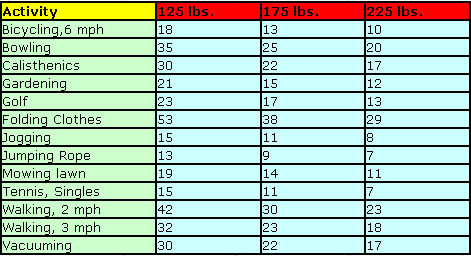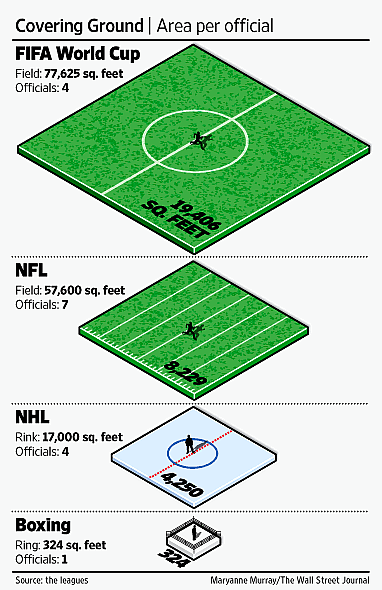| |
 |
FITNESS…
Preparing and Training…A 100 CALORIE PROPOSAL
Linda Marsa
LA Times Staff Writer
 |
Burning... 100 Calories

Referee Fitness - Body Mass Index Guide is HERE!!!

Cutting out just 100 calories a day (roughly 25 M&Ms) -- or burning off
the equivalent -- could prevent the gradual weight gain that's making
many Americans fat.
Nutrition researchers have done the math and found that, although such
an incremental strategy probably isn't enough for weight loss, it would
stem the nation's rising obesity rate.
"What we're doing isn't working so we've got to come up with something
completely different," says James O. Hill, lead author of an article
published last week in the journal Science. "One less soft drink, or
walking an extra mile -- it's an easy change to make."
The research comes at an opportune time: Roughly two-thirds of the adult
population is overweight. If current trends continue, two out of five
Americans will be obese by 2008, which ups the risks for heart disease,
cancer, diabetes and depression.
Scientists at the Center for Human Nutrition, located at the University
of Colorado Health Sciences Centers in Denver, and their colleagues say
that small changes could offset weight gain in roughly 90% of the
population.
Their calculations are based on some simple facts. Data collected by the
National Health and Nutrition Examination Survey and the Coronary Artery
Risk Development in Young Adults indicated that we're gaining an average
of 14 to 16 pounds in eight years, which translates to about 1.8 to 2
pounds a year. Given that 3,500 calories equals one pound of body fat,
researchers calculated that 90% of the population is gaining up to 50
extra calories a day.
Since the body isn't 100% efficient, Hill and his colleagues figured
that for every 100 calories consumed, about 50 would be stored as fat.
Hence, subtracting 100 calories a day, either by exercising more or
eating less, would close the so-called "energy gap," which is the
difference between the number of calories we consume and what we burn
off.
"The challenge is producing such a reduction consistently in daily
life," Hill says.
Experts agree that environment is what is driving this epidemic, rather
than biology. Although weight, height and metabolism vary from person to
person, the primary reason that growing numbers of Americans are
seriously overweight -- and more are joining their ranks every day -- is
a changing environment. Time pressures prompt us to drive rather than
walk, take the elevator instead of the stairs, and wolf down gargantuan
Big Macs while we're behind the wheel talking on our cell phones.
The cumulative effects of the increased portion size and our more
sedentary lifestyle are that the majority of Americans have difficulty
maintaining a normal energy balance and now consume more calories than
they expend, according to Dr. Benjamin Caballero, director of the Center
for Human Nutrition at Johns Hopkins University School of Public Health
in Baltimore.
"We live in a society that promotes excess weight gain," he says. "It's
impossible to do almost anything without getting into a car, and food is
readily available throughout the day."
The other part of the problem is that most people are clueless as to the
caloric content of their favorite munchies, and engage in mindless
snacking while watching TV or driving that adds up. Even some salads
that are chock-full of fried chicken, cheeses, or fat-laden dressings
can contain 800 calories, comparable to a hot fudge sundae.
"We think we're being virtuous," says Randi Konikoff Beranbaum, a
dietitian at Tufts University in Boston. "But there are minefields
everywhere."
100 Calories of Food...
You can eliminate 100 a
calories day by eating less or exercising more.
Here are portions of food that amount to 100 calories:
1/2 cup cooked white rice
1 tablespoon butter
1/4 of a bagel
2 doughnut holes
1/2 small order of fries
2 tablespoons of most salad dressings
3/4 cup cereal
2 cups popcorn
1 cup Coca-Cola
4 Hershey's Kisses
25 M&Ms
25 jelly beans
15 medium-sized thin pretzel twists
1 tablespoon mayonnaise
... and how to burn them off
Here's how much time it takes
to burn off...
100 calories, in minutes, for individuals of various body
weights:
Your Weight Activity 125 pounds - 175 pounds - 225
pounds
Bicycling, 6 mph 18 - 13 - 10
Bowling 35 - 25 - 20
Calisthenics 30 - 22 - 17
Gardening 21 - 15 - 12
Golf 23 - 17 - 13
Folding clothes 53 - 38 - 29
Jogging 15 - 11 - 8
Jumping rope 13 - 9 - 7
Mowing the lawn 19 - 14 - 11
Tennis, singles 15 - 11 - 7
Walking, 2 mph 42 - 30 - 23
Walking, 3 mph 32 - 23 - 18
Vacuuming 30 - 22 - 17
Source: Mayo Clinic Health Letter,
February 2003
|
